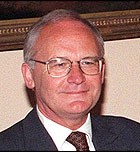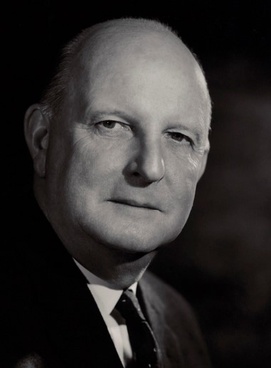Peerages in the United Kingdom form a legal system comprising both hereditary and lifetime titles, composed of various ranks, and within the framework of the Constitution of the United Kingdom form a constituent part of the legislative process and the British honours system. The term peerage can be used both collectively to refer to the entire body of titled nobility, and individually to refer to a specific title. British peerage title holders are termed peers of the Realm.
A courtesy title is a form of address in systems of nobility used for children, former wives and other close relatives of a peer, as well as certain officials such as some judges and members of the Scottish gentry. These styles are used "by courtesy" in the sense that persons referred to by these titles do not themselves hold substantive titles. There are several different kinds of courtesy titles in the British peerage system.

Gareth Wyn Williams, Baron Williams of Mostyn,, was a Welsh barrister and Labour politician who was Leader of the House of Lords, Lord President of the Council and a member of the Cabinet from 2001 until his sudden death in 2003.
Forms of address used in the United Kingdom are given below.

Earl of Macclesfield is a title that has been created twice. The first creation came in the Peerage of England in 1679 in favour of the soldier and politician Charles Gerard, 1st Baron Gerard. He had already been created Baron Gerard, of Brandon in the County of Suffolk, in 1645, and was made Viscount Brandon, of Brandon in the County of Suffolk, at the same time as he was given the earldom. These titles are also in the Peerage of England. Lord Macclesfield was the great-grandson of the distinguished judge Sir Gilbert Gerard, Master of the Rolls from 1581 to 1594. He was succeeded by his eldest son, the second Earl. He was involved in the Rye House Plot of 1683, was sentenced to death but later pardoned by the King. On his death without legitimate issue in 1701 the titles passed to his younger brother, the third Earl. He had earlier represented Yarmouth, Lancaster and Lancashire in the House of Commons. When he died in 1702 the titles became extinct.

Baron Kenyon, of Gredington, in the County of Flint, is a title in the Peerage of Great Britain. It was created in 1788 for the lawyer and judge Sir Lloyd Kenyon, 1st Baronet. He served as Master of the Rolls and as Lord Chief Justice of England and Wales. Kenyon had already been created a Baronet, of Gredington in the County of Flint, in 1784. His grandson, the third Baron, briefly represented St Michael's in the House of Commons. His grandson, the fourth Baron, held minor office in the governments of Lord Salisbury, Arthur Balfour and David Lloyd George and also served as Lord Lieutenant of Denbighshire. In 1912 Lord Kenyon assumed by Royal licence the additional surname of Tyrell. As of 2019 the titles are held by his great-grandson, the seventh Baron, who succeeded his father in 2019.
Baron Hives, of Duffield in the County of Derby, is a title in the Peerage of the United Kingdom. It was created 7 July 1950 for the Ernest Hives, Chairman of Rolls-Royce Ltd. As of 2010 the title is held by his grandson, the third Baron, who succeeded his uncle in 1997.

Baron Glentoran, of Ballyalloly in the County of Down, is a title in the Peerage of the United Kingdom. It was created on 8 July 1939 for the Unionist politician Herbert Dixon. In 1950 he also succeeded his elder brother as third Baronet, of Ballymenock. His son, the second Baron, was also a politician and served as the last Speaker of the Senate of Northern Ireland. As of 2017 the titles are held by the latter's son, the third Baron, who succeeded in 1995. He is a former Olympic bobsleigh gold medallist as well as a soldier, businessman and politician. Lord Glentoran was one of the ninety elected hereditary peers who remain in the House of Lords after the passing of the House of Lords Act 1999, and sat on the Conservative benches until his June 2018 retirement under the House of Lords Reform Act 2014.
Baron Aldington, of Bispham in the County Borough of Blackpool, is a title in the Peerage of the United Kingdom. It was created on 29 January 1962 for the Conservative politician and businessman, Sir Toby Low. On 16 November 1999 he was made a life peer as Baron Low, of Bispham in the County of Lancashire, as were all hereditary peers of the first creation following the House of Lords Act 1999. On his death in 2000 the life peerage became extinct while he was succeeded in the hereditary barony by his son Charles, the second and present holder of the title.

Baron Stratheden, of Cupar in the County of Fife, and Baron Campbell, of St Andrews in the County of Fife, are two titles in the Peerage of the United Kingdom. The titles were created in 1836 and 1841 respectively. The barony of Stratheden was created for the Hon. Mary, Lady Campbell, wife of the prominent lawyer and Whig politician Sir John Campbell, and daughter of James Scarlett, 1st Baron Abinger. Sir John Campbell, who in 1836 served as Attorney-General in the Whig administration of Lord Melbourne, had twice been overlooked for the office of Master of the Rolls, and was about to tender his resignation to Melbourne as a result of this. However, he was talked out of resigning when it was decided that, in recognition of the value of his services, his wife should be raised to the peerage. Five years later he was himself created Baron Campbell on his appointment as Lord Chancellor of Ireland. He later held office as Lord High Chancellor of Great Britain.
Baron Silkin, of Dulwich in the County of London, is a title in the Peerage of the United Kingdom. It was created on 4 July 1950 for the solicitor and Labour politician Lewis Silkin. The peerage was disclaimed by both his eldest son, the second Baron, and the latter's nephew, the third Baron. When the third Baron disclaimed the title in 2002, the barony of Silkin became the first peerage ever to be disclaimed twice; and the only disclaimer since the House of Lords Act 1999
Baron Bridges, of Headley in the County of Surrey and of Saint Nicholas at Wade in the County of Kent, is a title in the Peerage of the United Kingdom. It was created on 4 February 1957 for the prominent civil servant Sir Edward Bridges. He was Cabinet Secretary from 1938 to 1946. He was succeeded by his son, the second Baron, in 1969. He notably served as British Ambassador to Italy from 1983 to 1987. Lord Bridges was one of the ninety-two elected hereditary peers that remained in the House of Lords after the passing of the House of Lords Act 1999, before his removal for non-attendance in 2016. As of 2017 the title is held by his son, the third Baron, who succeeded to the title in that year. He was the solicitor to, among others, Queen Elizabeth II and other members of the royal family.
Baron Rotherwick, of Tylney in the County of Southampton, is a title in the Peerage of the United Kingdom.

Baron Gardner, of Uttoxeter, is a dormant title in the Peerage of Ireland. It was created in 1800 for Sir Alan Gardner, an Admiral of the Blue and former Member of Parliament for Plymouth and Westminster. In 1806, he was also created Baron Gardner, of Uttoxeter in the County of Stafford, in the Peerage of the United Kingdom. His son, the second Baron, was also an Admiral in the Royal Navy. In 1815, it was announced that he was to be created a viscount, but Lord Gardner died before the patent had passed the Great Seal.

Anthony Peter Clarke, Baron Clarke of Stone-cum-Ebony, is a British lawyer. He was one of the first 11 Supreme Court of the United Kingdom Justices and was the first High Court judge to be appointed directly to that court when it came into existence on 1 October 2009 without previously having sat as a Lord of Appeal in Ordinary. He was appointed to the Court of Final Appeal of Hong Kong on 11 April 2011 as a non-permanent judge. He was previously Master of the Rolls and Head of Civil Justice in England and Wales. He retired from the Supreme Court in September 2017.
Herbert Smith LLP was a multinational law firm headquartered in London, United Kingdom. The firm was founded in the City of London in 1882 by Norman Herbert Smith and merged with the Australian law firm Freehills on 1 October 2012, forming Herbert Smith Freehills. At the time of the merger it had 13 offices across Europe, the Middle East and Asia, around 240 partners and 1,300 fee-earners. It was regarded as forming part of the "Silver Circle" of leading British law firms.

Alfred Tristram Lawrence, 1st Baron Trevethin, PC was a British lawyer and judge. He served as Lord Chief Justice of England and Wales from 1921 to 1922. He is best remembered for the questionable manner in which he became Lord Chief Justice, under a plan devised by David Lloyd George.
G3, or the Good Governance Group, is a strategic advisory consultancy which specialises in providing advice on risk mitigation, governance, cyber security and regulatory compliance.

George James Cole, Baron Cole, GBE, was a British industrialist and politician. He was raised to the peerage on 24 March 1965.
Duncan William McNair, KHS is a commercial and corporate litigation lawyer, author and charity campaigner, the youngest of seven children of Squadron Leader Robin McNair, DFC and Bar, and his wife, Estelle, who was a great-niece of Surgeon-General Sir Edmond Townsend KCB CMG.










